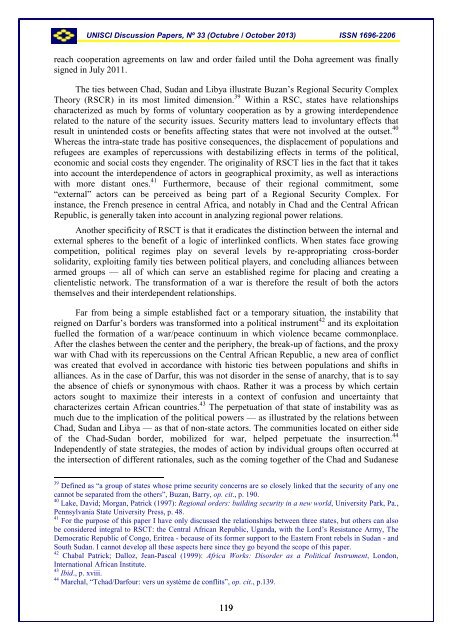UNISCI - Universidad Complutense de Madrid
UNISCI - Universidad Complutense de Madrid
UNISCI - Universidad Complutense de Madrid
You also want an ePaper? Increase the reach of your titles
YUMPU automatically turns print PDFs into web optimized ePapers that Google loves.
<strong>UNISCI</strong> Discussion Papers, Nº 33 (Octubre / October 2013) ISSN 1696-2206reach cooperation agreements on law and or<strong>de</strong>r failed until the Doha agreement was finallysigned in July 2011.The ties between Chad, Sudan and Libya illustrate Buzan’s Regional Security ComplexTheory (RSCR) in its most limited dimension. 39 Within a RSC, states have relationshipscharacterized as much by forms of voluntary cooperation as by a growing inter<strong>de</strong>pen<strong>de</strong>ncerelated to the nature of the security issues. Security matters lead to involuntary effects thatresult in uninten<strong>de</strong>d costs or benefits affecting states that were not involved at the outset. 40Whereas the intra-state tra<strong>de</strong> has positive consequences, the displacement of populations andrefugees are examples of repercussions with <strong>de</strong>stabilizing effects in terms of the political,economic and social costs they engen<strong>de</strong>r. The originality of RSCT lies in the fact that it takesinto account the inter<strong>de</strong>pen<strong>de</strong>nce of actors in geographical proximity, as well as interactionswith more distant ones. 41 Furthermore, because of their regional commitment, some“external” actors can be perceived as being part of a Regional Security Complex. Forinstance, the French presence in central Africa, and notably in Chad and the Central AfricanRepublic, is generally taken into account in analyzing regional power relations.Another specificity of RSCT is that it eradicates the distinction between the internal an<strong>de</strong>xternal spheres to the benefit of a logic of interlinked conflicts. When states face growingcompetition, political regimes play on several levels by re-appropriating cross-bor<strong>de</strong>rsolidarity, exploiting family ties between political players, and concluding alliances betweenarmed groups — all of which can serve an established regime for placing and creating aclientelistic network. The transformation of a war is therefore the result of both the actorsthemselves and their inter<strong>de</strong>pen<strong>de</strong>nt relationships.Far from being a simple established fact or a temporary situation, the instability thatreigned on Darfur’s bor<strong>de</strong>rs was transformed into a political instrument 42 and its exploitationfuelled the formation of a war/peace continuum in which violence became commonplace.After the clashes between the center and the periphery, the break-up of factions, and the proxywar with Chad with its repercussions on the Central African Republic, a new area of conflictwas created that evolved in accordance with historic ties between populations and shifts inalliances. As in the case of Darfur, this was not disor<strong>de</strong>r in the sense of anarchy, that is to saythe absence of chiefs or synonymous with chaos. Rather it was a process by which certainactors sought to maximize their interests in a context of confusion and uncertainty thatcharacterizes certain African countries. 43 The perpetuation of that state of instability was asmuch due to the implication of the political powers — as illustrated by the relations betweenChad, Sudan and Libya — as that of non-state actors. The communities located on either si<strong>de</strong>of the Chad-Sudan bor<strong>de</strong>r, mobilized for war, helped perpetuate the insurrection. 44In<strong>de</strong>pen<strong>de</strong>ntly of state strategies, the mo<strong>de</strong>s of action by individual groups often occurred atthe intersection of different rationales, such as the coming together of the Chad and Sudanese39 Defined as “a group of states whose prime security concerns are so closely linked that the security of any onecannot be separated from the others”, Buzan, Barry, op. cit., p. 190.40 Lake, David; Morgan, Patrick (1997): Regional or<strong>de</strong>rs: building security in a new world, University Park, Pa.,Pennsylvania State University Press, p. 48.41 For the purpose of this paper I have only discussed the relationships between three states, but others can alsobe consi<strong>de</strong>red integral to RSCT: the Central African Republic, Uganda, with the Lord’s Resistance Army, TheDemocratic Republic of Congo, Eritrea - because of its former support to the Eastern Front rebels in Sudan - andSouth Sudan. I cannot <strong>de</strong>velop all these aspects here since they go beyond the scope of this paper.42 Chabal Patrick; Dalloz, Jean-Pascal (1999): Africa Works: Disor<strong>de</strong>r as a Political Instrument, London,International African Institute.43 Ibid., p. xviii.44 Marchal, “Tchad/Darfour: vers un système <strong>de</strong> conflits”, op. cit., p.139.119
















